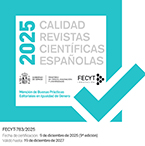MOOCs: substitute or complement of traditional training?
DOI:
https://doi.org/10.51302/tce.2020.439Keywords:
massive open online courses (MOOCs), teaching innovation, communication technologies, flipped classroomAbstract
Massive open online courses (MOOCs) represent one of the greatest exponents of the use of new technologies in education, since they eliminate physical barriers and allow students from any corner of the world to access high quality studies free of charge.
With the aim of studying if, in this sense, MOOCs can become a threat to traditional universities, or if they can become a tool that allows to improve university teaching and facilitate the use of active teaching methodologies, we create four MOOC courses in related areas of knowledge and we use them as a tool for the use of methodologies such as flipped learning in students of the same degree.
The results show a very notable improvement in student grades as a result of the use of MOOCs, and, as regular users of the new technologies that they are, they value the use of digital tools in the survey conducted very positively. However, when asked about the ideal way to receive teaching, they almost unanimously preferred the joint use of MOOCs with face-to-face teaching, showing reluctance to teaching conducted only online through MOOCs.
Downloads
References
Aguado Franco, J. C. (2017a). ¿Pueden los MOOC favorecer el aprendizaje, disminuyendo las tasas de abandono universitario? Revista Iberoamericana de Educación a Distancia, 20(1), 125-143.
Aguado Franco, J. C. (2017b). Visión de los MOOC desde una perspectiva práctica. Revista Iberoamericana de Educación a Distancia, 20(1), 31-38.
Bartolomé, A. (2013). Qué se puede esperar de los MOOC. Comunicación y Pedagogía, 269-270, 49-55.
Barba, P. G. de, Kennedy, G. E. y Ainley, M. D. (2016). The role of students' motivation and participation in predicting performance in a MOOC. Journal of Computer Assisted Learning, 32(3), 218-231. doi: https://doi.org/10.1111/jcal.12130.
Bergmann, J. y Sams, A. (2012). Flip Your Classroom: Reach Every Student in Every Class Every Day. Washington DC, EE. UU.: International Society of Technology in Education.
Bradford, W. C. (2011). Reaching the visual learner: teaching property through art. The Law Teacher, 11, 1-6.
Clarke, T. (2013). The advance of the MOOCs (massive open online courses): the impending globalisation of business education. Education + Training, 55(4/5), 403-413.
Conjin, R., Beemt, A. van den y Cuijpers, P. (2018). Predicting student performance in a blended MOOC. Journal of Computer Assisted Learning, 34, 615-628.
García Aretio, L. (2015). MOOC, ¿tsunami, revolución o moda pasajera? Revista Iberoamericana de Educación a Distancia, 18(1), 9-21.
Gasevic, D., Kovanovic, V. Jokosimovic, S. y Simens, G. (2014). Where is research on massive open online courses headed? A data analysis of the MOOC research initiative. The International Review of Research in Open and Distance Learning, 15(5), 134-176. doi: http://dx.doi.org/10.19173/irrodl.v15i5.1954.
Guillén, J. C. (2017). Neuroeducación en el aula: de la teoría a la práctica. Create Space.
Holotescu, C., Grosseck, G., Cretu, V. y Naaji, A. (2014). Integration MOOCs in blended courses. Proceedings at the 10th International Scientific Conference on eLearning and software for Education, Bucarest, 24-25.
Israel, M. J. (2015). Effectiveness of integrating MOOCs in traditional classrooms for undergraduate students. International Review of Research in Open and Distributed Learning, 16(5), 102-118. doi: https://doi.org/10.19173/irrodl.v16i5.2222.
Jensen, E. y Snider, C. (2013). Turnaround Tools for the Teenage Brain. San Francisco, EE. UU.: Jossey-Bass.
Li, K. (2019). MOOC learners’ demographics, self-regulated learning strategy, perceived learning and satisfaction: a structural equation modeling approach. Computers and Education, 132, 16-30.
Mirriahi, N., Alonzo, D., McIntyre, S., Kligyte, G. y Fox, B. (2015). Blended learning innovations: leadership and change in one australian institution. International Journal of Education and Development using Information and Communication Technology, 11(1), 4-16.
Mora, F. (2013). Neuroeducación: solo se puede aprender aquello que se ama. Madrid, España: Alianza Editorial.
Mora, F. (2018). Mitos y verdades del cerebro. Barcelona, España: Paidós Ibérica.
Nazarenko, A. L. (2015). Blended learning versus traditional learning: what works? (a case study research). Procedia-Social and Behavioral Sciences, 200(22), 77-82.
Raposo, M., Martínez, M.ª E. y Sarmiento, J. A. (2015). Un estudio sobre los componentes pedagógicos de los cursos online masivos. Comunicar, 22(44), 27-35.
Santiago, R. y Bergmann, J. (2018). Aprender al revés: flipped learning 3.0 y metodologías activas en el aula. Paidós Educación.
Santiago, R., Díez, A. y Andía, L. A. (2017). Flipped classroom. 33 experiencias que ponen patas arriba el aprendizaje. Barcelona, España: Editorial UOC.
Tokuhama-Espinosa, T. (2011). Mind, Brain, and Education Science. A Comprehensive Guide to the New Brain-Based Teaching. W. W. Norton & Company.
Weinhardt, J. M. y Sitzmann, T. (2019). Revolutionizing training and education? Three questions regarding massive open online courses (MOOCs). Human Resource Management Review, 29, 218-225. doi: https://doi.org/10.1016/j.hrmr.2018.06.004.
Yousef, A., Chatti, M., Schroeder, U. y Wosnitza, M. (2015). A usability evaluation of a blended MOOC environment: an experimental case study. The International Review of Research in Open and Distributed Learning, 16(2), 69-93.
Yuan, L., Powell, S. y Olivier, B. (2014). Beyond MOOCs: Sustainable Online Learning in Institutions. CETIS, University of Bolton.
Zhang, X., Huang, X., Wang, F. y Cao, X. (2018). Research on MOOC-based blended learning of programming language course. International Conference on Humanities and Advanced Education Technology (ICHAET 2018) (pp. 586-591).
Downloads
Published
How to Cite
Issue
Section
License
Copyright (c) 2020 Juan Carlos Aguado Franco

This work is licensed under a Creative Commons Attribution-NonCommercial-NoDerivatives 4.0 International License.


























